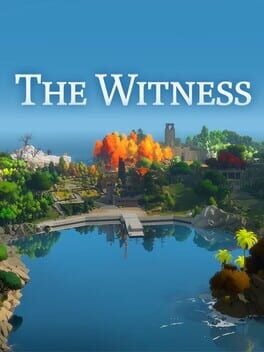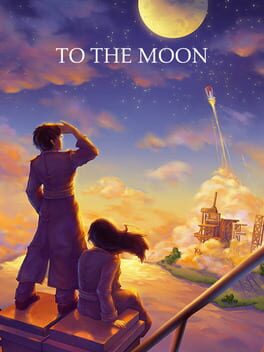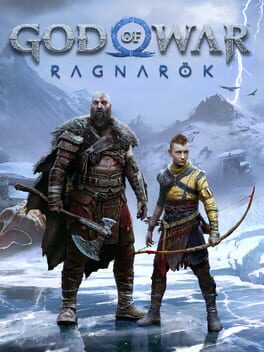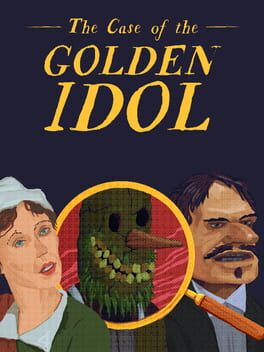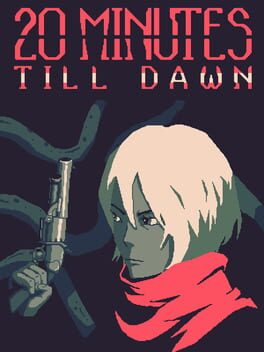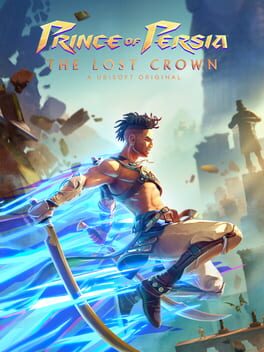pluggedingaming
Bio
Completionist, usually. I like strong narratives and puzzle games, just give me something new.
Completionist, usually. I like strong narratives and puzzle games, just give me something new.
Badges

Popular
Gained 15+ followers

Gamer
Played 250+ games

GOTY '23
Participated in the 2023 Game of the Year Event

Loved
Gained 100+ total review likes

GOTY '22
Participated in the 2022 Game of the Year Event

2 Years of Service
Being part of the Backloggd community for 2 years

Liked
Gained 10+ total review likes

Noticed
Gained 3+ followers

N00b
Played 100+ games

GOTY '21
Participated in the 2021 Game of the Year Event
Favorite Games
256
Total Games Played
000
Played in 2024
013
Games Backloggd
Recently Played See More
Recently Reviewed See More
A good evolution of the Vampire Survivors idea, with a greater emphasis on choosing a loadout and building up skills and builds. I eneded up using Lilith with the bat gun for a significant portion of my way up to the final difficulty level. The game overall is fun, a great podcast/music listening game, but the road to "completing" it is a little repetitive and I wish more elements of each run would change to keep players on their toes. Had fun though and is worth it for fans of the idea.
Bubblegum Bandit is a cute little action platformer where you must infiltrate spaceships and steal the reactor core at the center of each. To complete this task, you have the ability to flip gravity back and forth, while also armed with a bubblegum pistol to stick enemies and objects in place. There are a lot of fun moments that remind me of VVVVVV, but this game is much more bite-sized. I liked the steady introduction of new mechanics and the music and visuals were pretty good. I wish there were more different environments, and some of the controls felt a little unintuitive, but overall, I rescued all the hostages and completed the game.
How do you possibly stand out in an oversaturated genre? Prince of Persia: The Lost Crown, despite its striking change in perspective, had an uphill battle entering one of the most covered subsections of the gaming space in the last few years. Thankfully, Ubisoft has crafted a consistently entertaining and challenging Metroidvania that stands amongst the best of its contemporaries, while not losing the identity of the franchise or forgetting to bring something new to the table.
The Lost Crown opens with an introduction to the Immortals, a band of mercenaries with a host of extraordinary abilities. When they return from a successful mission to discover the Prince has been kidnapped, they venture off to the mysterious Mount Qaf to investigate. You play as Sargon, the scrappy underdog of the group, who finds out things aren't as they appear in the Citadel or within his own compatriates, as he ventures of to find the Prince. The story overall is relatively predictable, but is nice to have something guiding the adventure. There are definitely some fun setpiece moments and The Lost Crown adapts an anime-like aesthetic that really makes the bigger action scenes pop. This exaggerated style carries through to the combat and traversal, which are equally flashy and satisfying.
The world of Mount Qaf is MASSIVE. The Lost Crown boasts a comparatively lengthy runtime for a Metroidvania, with about a dozen unique areas to explore and secrets to find. TLC starts similar to any game of the genre: you start with basic movement and combat abilities and exploring the world helps expand both fighting and exploring capabilities. Exploration is standard Metroidvania fare, but a new excellent idea is Visions, which allow you to place a pin on the map that also screenshots the area. This allows players to recall exactly what caused a roadblock on a particular path and allows you to quickly find it when you have the desired ability. Visions, alongside pins and a reliable map system create a Metroidvania that is a breeze to find every secret for, which is a common complaint I have frequently.
Combat is just as refined, taking cues mostly from games like Guacamelee. You have start attack combos, as well as a ranged weapon you get early on. Collectible amulets add modifiers to your combat style (i.e. More health, less elemental damage) and can be upgraded alongside your weapons. A special move gauge, titled the Athra meter, builds up as you deal and take damage, allowing you to execute a massive attack or buff when you fill it up. My strategy was to equip Amulets to build the Athra meter up quickly and then unleash the attacks upon any enemy who dared test Sargon. I loved how gradually the combat blossomed throughout the adventure, and by the conclusion, Sargon is zipping around and becomes an extremely mobile character. This doesn't come at the cost of difficulty though, as the enemies get harder and more unpredictable the deeper you go. I was still taking significant damage late in the game, despite having the ability to cross ravines of spikes with no issues.
The platforming challenges in TLC are no joke. Some of the side paths and hidden areas can get really challenging, but the main path stays relatively achievable to not alienate players who may want to just see the ending. Ubisoft has added a bunch of really accessible options as well as modifiers to allow for anyone to enjoy the game (even difficulty settings, which I feel is a rare occurance in the genre). I have only a few minor gripes. The Dimension Shift ability is tied to clicking in the stick, and with how you need to use it, that input is awkward every time. I also ran into a few technical issues, from a few moments of the game catching up to itself and the game crashing once, forcing me to redo a few minutes of progress. TLC mitigates as much of this as possible, but it's not perfect. That said, I played the Switch version and it is a truly excellent way to play. Not only do you have the option of handheld, but the Metroidvania genre feels at home on the Switch hardware and the game never suffered in performance to accommodate the older hardware. I really liked my time with The Lost Crown. Despite never playing a Prince of Persia game, I was invested in the characters and would love to see Ubisoft create more AAA Metroidvanias. It's an automatic recommend for any fans of the genre.
The Lost Crown opens with an introduction to the Immortals, a band of mercenaries with a host of extraordinary abilities. When they return from a successful mission to discover the Prince has been kidnapped, they venture off to the mysterious Mount Qaf to investigate. You play as Sargon, the scrappy underdog of the group, who finds out things aren't as they appear in the Citadel or within his own compatriates, as he ventures of to find the Prince. The story overall is relatively predictable, but is nice to have something guiding the adventure. There are definitely some fun setpiece moments and The Lost Crown adapts an anime-like aesthetic that really makes the bigger action scenes pop. This exaggerated style carries through to the combat and traversal, which are equally flashy and satisfying.
The world of Mount Qaf is MASSIVE. The Lost Crown boasts a comparatively lengthy runtime for a Metroidvania, with about a dozen unique areas to explore and secrets to find. TLC starts similar to any game of the genre: you start with basic movement and combat abilities and exploring the world helps expand both fighting and exploring capabilities. Exploration is standard Metroidvania fare, but a new excellent idea is Visions, which allow you to place a pin on the map that also screenshots the area. This allows players to recall exactly what caused a roadblock on a particular path and allows you to quickly find it when you have the desired ability. Visions, alongside pins and a reliable map system create a Metroidvania that is a breeze to find every secret for, which is a common complaint I have frequently.
Combat is just as refined, taking cues mostly from games like Guacamelee. You have start attack combos, as well as a ranged weapon you get early on. Collectible amulets add modifiers to your combat style (i.e. More health, less elemental damage) and can be upgraded alongside your weapons. A special move gauge, titled the Athra meter, builds up as you deal and take damage, allowing you to execute a massive attack or buff when you fill it up. My strategy was to equip Amulets to build the Athra meter up quickly and then unleash the attacks upon any enemy who dared test Sargon. I loved how gradually the combat blossomed throughout the adventure, and by the conclusion, Sargon is zipping around and becomes an extremely mobile character. This doesn't come at the cost of difficulty though, as the enemies get harder and more unpredictable the deeper you go. I was still taking significant damage late in the game, despite having the ability to cross ravines of spikes with no issues.
The platforming challenges in TLC are no joke. Some of the side paths and hidden areas can get really challenging, but the main path stays relatively achievable to not alienate players who may want to just see the ending. Ubisoft has added a bunch of really accessible options as well as modifiers to allow for anyone to enjoy the game (even difficulty settings, which I feel is a rare occurance in the genre). I have only a few minor gripes. The Dimension Shift ability is tied to clicking in the stick, and with how you need to use it, that input is awkward every time. I also ran into a few technical issues, from a few moments of the game catching up to itself and the game crashing once, forcing me to redo a few minutes of progress. TLC mitigates as much of this as possible, but it's not perfect. That said, I played the Switch version and it is a truly excellent way to play. Not only do you have the option of handheld, but the Metroidvania genre feels at home on the Switch hardware and the game never suffered in performance to accommodate the older hardware. I really liked my time with The Lost Crown. Despite never playing a Prince of Persia game, I was invested in the characters and would love to see Ubisoft create more AAA Metroidvanias. It's an automatic recommend for any fans of the genre.


